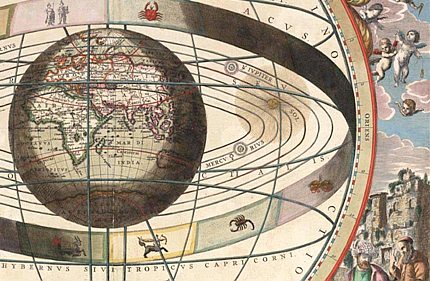The 19th-century French astronomer Alexis Bouvard deduced the existence of an as yet undiscovered eighth planet of the solar system by measuring the discrepancies between the predicted path of the planet Uranus and its telescopically observed positions at different points along its orbit. Later astronomers discovered “Planet X” — which was eventually named Neptune — in the precise orbital position laid out by Bouvard’s calculations.
We are in much the same predicament regarding the controversy over Diana West’s book American Betrayal. Based on perturbations in the scholarly orbits of numerous illustrious writers and editors, we may deduce the existence of a massive undiscovered black body. It’s out there somewhere, exerting its gravitational influence on its planetary neighbors in the ranks of conservative American literati. We can’t see Planet X, but we can observe its effects. We know it’s there.
No firm conclusions can be drawn about this mysterious astronomical object. Without access to sources on the editorial boards of FrontPage Magazine, Pajamas Media, National Review, etc., there is no way to determine the motivation behind the repeated, virulent, personal attacks against Diana West.
However, after pulling together information from a variety of sources, it’s possible to make some educated guesses. Although its exact position is not yet determined, Planet X is beginning to take shape out there in the night sky, blotting out segments of the starry host as it wanders past.
* * * * * * * * * * * * * * *
 This essay is the conclusion of a post begun six weeks ago, just before I went to Warsaw (Part 1 is here).
In the weeks since then, the attacks on Diana West have continued
sporadically, penned in large part by the same detractors who had
written previously, and published in the same venues. With the exception
of Vladimir Bukovsky and Pavel Stroilov — whose validation of American Betrayal
was the most significant work to date in support of Ms. West — no major
writer has weighed on her behalf since I wrote Part 1 back in
September.
This essay is the conclusion of a post begun six weeks ago, just before I went to Warsaw (Part 1 is here).
In the weeks since then, the attacks on Diana West have continued
sporadically, penned in large part by the same detractors who had
written previously, and published in the same venues. With the exception
of Vladimir Bukovsky and Pavel Stroilov — whose validation of American Betrayal
was the most significant work to date in support of Ms. West — no major
writer has weighed on her behalf since I wrote Part 1 back in
September.As Stacy McCain said this morning:
Diana West has many influential friends, and her adversaries also have many friends, but most people — especially those she calls “the capital-p pundits” — seem determined to stay as far away as possible from this ugly fight. And who can blame them? Nobody wants to get themselves muddied up in a mess like this.Yet a large number of ordinary people, small-fry-bloggers, and medium-size (“small-p”?) pundits — including Mr. McCain himself — have issued ringing declarations of support for Diana West and decried the ad-hominem attacks against her. Something out there is pulling the Capital-Ps away from any orbit that might intersect with public commentary on American Betrayal.
On October 31 Diana West was the guest of honor at the annual gathering of the Pumpkin Papers Irregulars, a group that honors the memory of Whittaker Chambers and his struggle against American Communism, and in particular his victory over Alger Hiss. Ms. West addressed the assembly about her book (see the link above for the full video of her speech).
M. Stanton Evans, one of the most respected experts on Soviet infiltration in the United States, has repeatedly and enthusiastically endorsed American Betrayal. So Diana West has earned the respect of many of the core writers who specialize in anti-communism. The notable exception is Ronald Radosh, who fired the first salvo in the war against American Betrayal with his attack at FPM in early August. Various acolytes followed suit over the next few weeks, the most prominent among them David Horowitz and Conrad Black.
Continue reading
